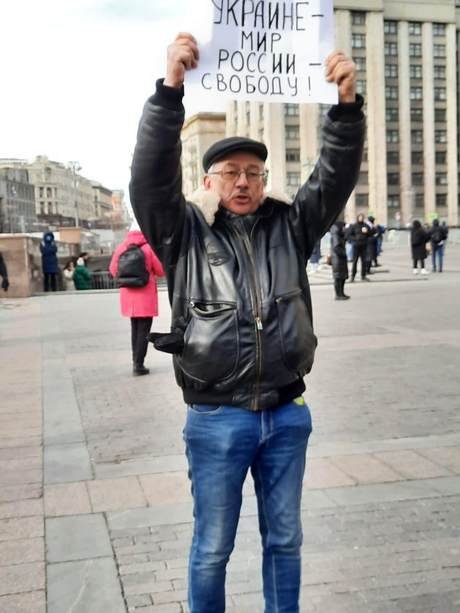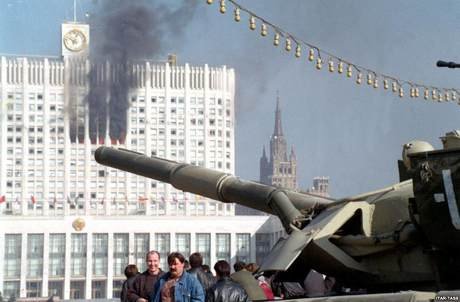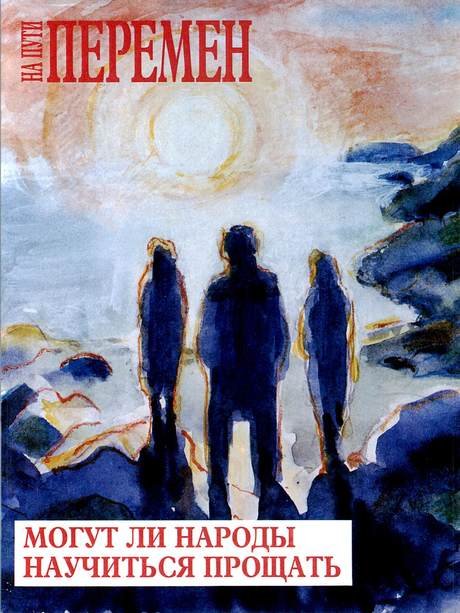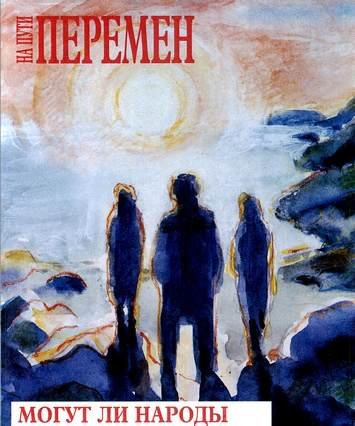I am scrolling through the Russian edition of the magazine “For a Change”, published back in 1992, and later digitized to find its second life on the “For A New world” web-site.
The issue was partly dedicated to the Caux Forum of 1990 attended by many participants from Eastern Europe, Russians among them.
Between that memorable Caux Forum and the publication of the magazine, the old communist regime would make a desperate attempt of revenge in late August 1991; their putsch would infamously collapse and the USSR shortly after would disintegrate to give rise to 15 newly born states.
As the texts slowly move down my screen, my memories involuntarily travel to that time. I was 16 years old and my country was parting – so it seemed, forever – from its totalitarian past to embrace a dazzling future full of new opportunities.
Economically, Russia lay in ruins in the early 1990s. Prices were skyrocketing, food was limited, clothing hardly existed at all. But great expectations thrilled us, the young generation of Russians. What was way more important than good food and salary, so we thought, was our freedom to choose whatever path we wished, to believe as our own conscience prompted us, and to build a new country we would like to live in.
31 years have passed since. I have just come home from the trial of Memorial International member Oleg Orlov to commence my now traditional prayer for peace. Memorial International was shut down by the Russian authorities in 2021, while in 2022 the smouldering conflict between Russia and Ukraine became a bloody, full-scale bloodshed.
I look again at this old issue of For a Change, trying to answer for myself what were those fatal mistakes that ultimately led my country into this darkness.
Rushing into the brave new life of 1992, we thought we had left behind the burden of the sins of communism. Due to glasnost and perestroika, we were fully aware of what crimes had been committed in the Soviet period. But just as Gasan Guseinov, a well-known Russian scholar and one of the authors of For a Change, we did not realize our own responsibility for the wrongs of the past. Refusal to recognize our own part in the common wrong would result in our inability to understand the cause of the evil. Not some mysterious and anonymous “Russian people” with their “gene of slavery and imperialism” – but all of us, students and professors, doctors and engineers, farmers and businessmen – we all preferred oblivion, thus allowing the transfer of the fundamental ingredients of Soviet totalitarianism into “democratic” Russia.
The current Russian state, with its ultra-nationalist ideology, cult of archaic traditions and self-righteousness, was a nightmare warning prophetically given to us in those messages of distant 1992. Already at the moment of collapse of the Soviet Union, Russian thinkers discerned how the communist ideology was mutating into nationalism based on the same cult of a strong leader and centralized state. That all other former Soviet republics preferred the position of victims contributed to the build up of Russian ressentiment. Each new nation, and first of all Russia, was focusing on its own sufferings. Accusing a neighbour – or an ethnic minority within the country - became a replacement therapy to treat the wounds of the past.
However, not only warnings but also important reference points were suggested to us. We were not listening. The voice of conscience, wisdom and common sense got drowned in the enthusiasm of post-Soviet entrepreneurship, in our struggle out of misery, in the criminal wars in big and small towns, in the mess of the first Chechen war, in the competition of political parties, in the economic collapse of the late 1990s…
While the best representatives of the Russian intelligentsia were warning against violence and reminding us about our shared responsibility on the pages of For a Change and numerous other quality papers, magazines and TV shows, early October 1993 brought a dramatic turning point. The first democratic Russian parliament had been growing dangerously pro-communist and pro-fascist, which forced the first democratically elected Russian president to order its dissolution in September 1993. Finally, on October 3, a long-lasting confrontation between the parliament and the president exploded into open street violence: police and army were shooting at the crowd which came to support the besieged deputies, while the leaders of the crowd called to arms in their turn. In the mess that followed 159 people were killed – most of them just passers-by. Best remembered are the videos of the tanks shooting at the white walls of the Parliament. They were spectacular though not what actually caused the deaths.
It was the removal of the taboo on using military force that became a real turning point.
On October 4 we were thanking God for our narrow escape. But the rubicon had already been crossed without us noticing it. Authoritarian presidential rule and military violence were recognized as the main pillars of the stability and safety of the state.
However, along with the gradual transformation of the young democratic Russia into an authoritarian and corrupt state, the Russia of conscience continued its development and growth. Memorial International, a human rights society organized on the initiative of Soviet academician and dissident Andrey Sakharov, was steadily working on documenting the crimes of the Soviet regime and educating people about our past. Its Human Rights Center was monitoring the conflict zones in Russia and neighbouring countries. Moscow Helsinki Group, Sakharov Museum and Centre and many other human rights societies were developing their public educational programmes, widening their network in Russia. Democratic media would regularly initiate honest investigations and open discussions of the most controversial questions.
I preferred to see the bright side of Russian reality. The challenges were obvious, life was hard, but optimistic signs outweighed these, I believed.
I was mistaken. The seeds of hatred and division planted in the tumultuous events of the 1990s, together with the unresolved conglomeration of the past, brought forth strong shoots that would transform the Russian moral environment beyond recognition. “The sun rises and the sun sets...”
Yet hope is still living. The hope is in Russians who continue fighting the evil, risking their freedom and lives. The hope is also in the growing longing for the truth.
However, a lot of hard work needs to be done and bitter lessons to be learned before the contours of positive transformation become visible.
Elena Shvarts, Moscow




